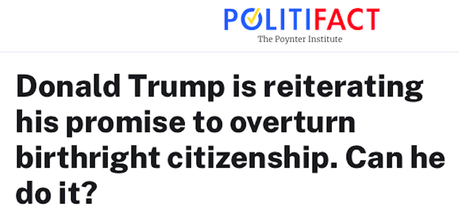
The following is part of a post at PolitiFact.com by Louis Jacobson:
During his first major interview since winning the 2024 presidential race, Donald Trump reiterated a promise he’s made multiple times: He will try to eliminate birthright citizenship, the longstanding practice of conferring citizenship on anyone born in the United States, even when the parents are noncitizens.
Birthright citizenship’s legal underpinningsThe notion of birthright citizenship can be traced to 1608 with Calvin’s Case, a British decision that became part of the common law adopted in the U.S. legal system’s early days. Calvin’s Case granted subjectship — a British concept that has since evolved into citizenship — to all children born in Scotland except those of diplomats and enemy troops in hostile occupation.
Three key pieces of legal precedent underpin birthright citizenship, scholars say.
First, there’s the 14th Amendment, which says that "all persons born or naturalized in the United States, and subject to the jurisdiction thereof, are citizens of the United States and of the state wherein they reside."
This amendment, ratified in 1868, "was unquestionably intended to cover the children of unauthorized migrants, namely the children of enslaved persons brought here by criminals after the prohibition of the slave trade," said Gabriel (Jack) Chin, a University of California, Davis, law professor.
Second, there’s the 1898 Supreme Court decision known as the Wong Kim Ark case. Wong Kim Ark, a laborer, was born in 1873 in San Francisco. His parents were Chinese and lived legally in the United States.
Around age 17, Wong left to visit China and returned to the United States without incident. Then, around age 21, he left again to visit China, but at the end of that trip, he was denied reentry to the United States because the collector of customs argued he was not a U.S. citizen. (This was no small distinction — it was the era of anti-Asian strictures known as the Chinese Exclusion Act.)
In its 6-2 majority decision, the Supreme Court’s justices ruled that Wong — and others born on United States soil, with a few clear exceptions — qualified for citizenship under the 14th Amendment.
"The Fourteenth Amendment affirms the ancient and fundamental rule of citizenship by birth within the territory, in the allegiance and under the protection of the country, including all children here born of resident aliens. … The Amendment, in clear words and in manifest intent, includes the children born, within the territory of the United States, of all other persons, of whatever race or color, domiciled within the United States," the court’s majority wrote in its decision.
Third, there’s a 1952 statute (8 U.S. Code § 1401) that echoes the 14th Amendment’s language . "The following shall be nationals and citizens of the United States at birth: (a) a person born in the United States, and subject to the jurisdiction thereof," the statute partly reads.
Peter J. Spiro, a Temple University Law School professor, said a strong argument for continuing birthright citizenship is that "that's how we've done it for more than a century now. The historical practice is well entrenched: The children of undocumented parents have always been extended birth citizenship. The practice has been uniform and, until recently, uncontested."
Birthright citizenship also includes people born abroad to U.S. citizens, but Trump has not indicated he would target that provision.
Could birthright citizenship be overturned by executive order?
The notion that an executive order could overturn birthright citizenship is dubious, legal experts said.
"If it's mandated by the Constitution, it can only be undone by a constitutional amendment," Spiro said. "If it's mandated by statute, it can only be undone by a subsequent statute. It's only if it's mandated by neither that (a president) could do it by executive order."
The most Trump could do on his own is sign an executive order with the expectation that opponents would sue to block its implementation, University of Pennsylvania law professor Kermit Roosevelt said. Then, birthright citizenship’s fate would be in the courts’ hands, potentially all the way up to the Supreme Court.
The president would effectively be "offering his interpretation" in an executive order, and this "tees up the lawsuit that will get the Supreme Court to rule, once and for all, what it means," said Mark Krikorian, executive director of the Center for Immigration Studies, a group that generally supports tighter immigration.
Stephen Yale-Loehr, a Cornell Law School professor specializing in immigration law, said that while the Supreme Court generally defers to presidents on immigration matters because they involve sovereignty and foreign affairs, "I don’t see how even this Supreme Court would allow a president to revoke a constitutional amendment through an executive order. Such a ruling would endanger all constitutional amendments."

